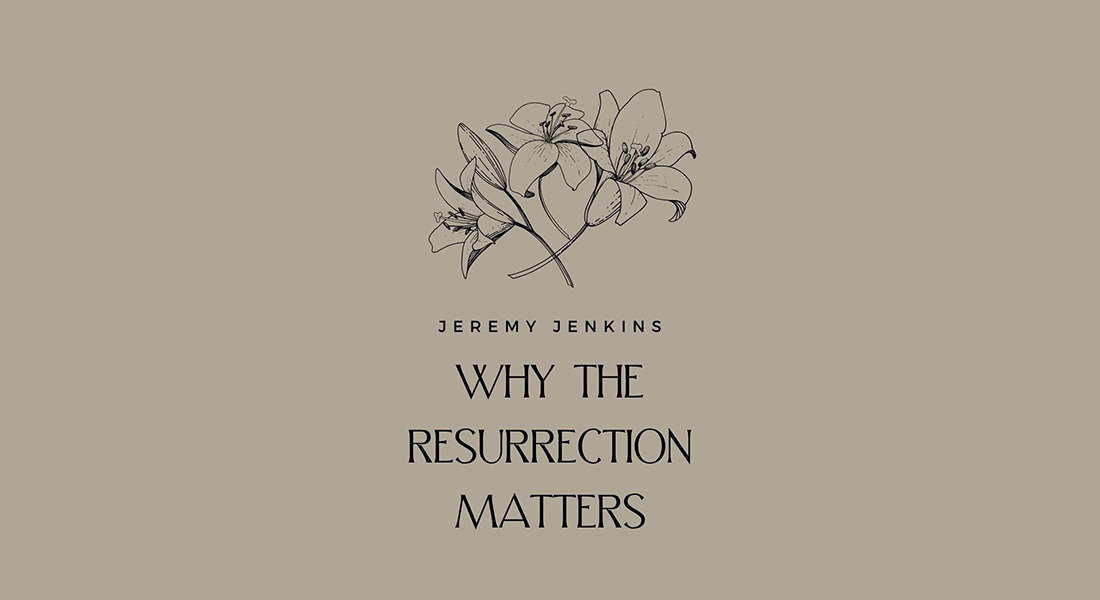
“Wasn’t Jesus just a failed apocalyptic preacher?”
I was speaking at an event on the University of South Carolina campus when a student read the question another student had submitted. While I imagine some might bristle at questions like that, it actually filled me with hope. A student from a generation rapidly finding the American Church devoid of anything worth sticking around for asked what essentially is the million-dollar question.
It was the question that prompted Paul to write many of his most powerful words. A question with an answer that has served as the fulcrum of much of humanity’s search for meaning for the last 2,000 years. Put simply, and perhaps less antagonistically than my Q&A attendees would, “What makes Jesus so special, and why should it matter to me?”
It should not be lost on us that each year our churches see attendance increase sharply on Easter. Pew Research reports that Google searches for “Church” spike nearly 25% during the week of Easter, only to usually be followed by returns to normal attendance just one week later. While this can largely be attributed to the rampant nominalism we see spreading through western Christianity, I think we as pastors need to own a share of this.
Those of us who stand on a stage or behind a pulpit have not forced the people listening to us on Resurrection Sunday to reckon with the reality of the resurrection, and what it means for them. We have instead settled for a quaint reminder that the story of humanity will one day have a nice ending, but ultimately, the Gospel might not have anything else for its hearers that day.
We then proceed to our egg hunts and family dinners, having not been made to look at the Gospel as it truly is: an earth-shattering story and moment in time we yearly pause to contemplate and celebrate. This moment 2,000 years ago, gives me the answer to the question that wonderful, questioning student asked.
The resurrection of Jesus causes it all to make sense and makes Jesus special and unique in our world of wanderers and wonderers.
The Resurrection
Tim Keller has said, “If Jesus rose from the dead, then you have to accept all that he said; if he didn’t rise from the dead, then why worry about any of what he said? The issue on which everything hangs is not whether or not you like his teaching but whether or not he rose from the dead.” Keller’s assessment stands true, but it seems that somewhere along the way, pastors and communicators of the resurrection message have lost the ability to convey to their hearers the significance of this event, or perhaps we are just complicating it too much.
The Significance of the Resurrection
At the heart of any explanation of Jesus should be an explanation of the significance of the resurrection and why one absolutely must decide what they think of it. On the one hand, many Christians will likely jump out of their seat, agreeing to the significance of the resurrection, yet might not quite understand what it accomplished in the first place. On the other hand, the non-Christian might scoff at a quote like Keller’s, which might seem to them to reek with arrogance at the notion that it is in the death and ensuing events of one man that all our answers in life might be found.
It is to both of these crowds that the Gospel speaks, though, and there is no shortage of answers and encouragement to satisfy the most earnest believer wanting to understand the crux of their belief to the most antagonistic skeptic who simply cannot get away from the noise surrounding this resurrection of Jesus that seems to be talked about so much every spring.
The Historical Reliability of the Resurrection
First, we must attempt to tackle the historical reliability of the resurrection account. While the average churchgoer has little to no need of functional knowledge of manuscript analysis or Greek vocabulary, they might need to be able to answer the question of why we should even believe Christ was resurrected in the first place and why it deserves any more attention than the fairytales we read to our children at night. Even if the question only comes from their own minds late at night lying in bed, the question is sure to come up at some point.
To bring us back to that room in South Carolina, why should anyone believe that there is anything that sets Jesus apart from the hundreds of other apocalyptic messiahs who wandered through Israel trying to woo crowds? Was Jesus just more charismatic than them?
Navigating the Topic: the “Minimal Facts” Approach
One of the simplest approaches to navigate the topic of the historicity of the resurrection is what is often called the “Minimal Facts” argument that Dr. Gary Habermas has popularized. In its various forms, it proposes that from simple and mostly agreed upon facts from history, we can deduce that it is likely that Jesus rose from the dead, or at least that his resurrection is a fathomable conclusion to come to, given what we know. Some of these facts are:
- It is agreed upon that Jesus of Nazareth did, in fact, exist. While there is a school of thought that becomes popular with pop-skeptics from time to time (that Jesus did not actually exist), the most antagonistic of non-Christian scholars scoff at this notion themselves. We can be as sure as anything else we know from the annals of history that Jesus did, in fact, exist.
- John Dominic Crossan, a hugely influential non-Christian scholar, wrote in his book, Jesus: A Revolutionary Biography, “That he was crucified is as sure as anything historical can ever be.” Crossan suggests here that the crucifixion of Jesus is an inarguable fact of history. It is actually one of the most attested to events in ancient history, as many non-Christian sources in antiquity have addressed, as well as being included in all four Gospel accounts.
- Jesus’ empty tomb is a logical conclusion, given the surrounding events. It was Jewish custom to bury the dead within a specific timeframe, and the Gospels give a record of Joseph of Arimathea offering his family tomb to house the body of Jesus. It would have followed that in the event of claims of resurrection from Jesus’ followers, that his body would have been produced.
- Jesus was said to have appeared before hundreds of witnesses in his resurrected form. Perhaps most interestingly, his first appearance was to women in the garden, and he utilized their testimony to gather his remaining disciples. In 1st century Jewish culture, the testimony of women was of little use. If this story had been fabricated, this detail would not have been included as emphasizing the women’s experience in the garden was no way to convince a male-dominated world that the Gospel took place in. Along with these women, the other apostles testified to seeing Jesus: Luke records Paul’s conversion experience on the road to Damascus after seeing the resurrected Jesus. Paul later wrote in his letter to the Corinthians that around 500 people had seen Jesus in his resurrected form. After these, many people witnessed something reported by various sources to be a resurrected Jesus. Many of these people radically changed the direction of their lives to then go and be witnesses to this resurrected Jesus all over the known world. The legends abound of Thomas in India, Peter upside down on a cross in Rome, and John being thrown in a vat of boiling oil. The reliability of these stories varies, but the reason for their believability is centered on the notion that what they witnessed in the events of Easter shook the foundation of their lives and caused them to absolutely change the entire world.
These historical claims are not without objection, and some apologists and theologians have addressed them in greater depth elsewhere. The point though is that the resurrection and what is staked to it in Christian thought is not a fabled notion; it is something that can be believed in confidently without fear of being exposed as a wishful thinking fraud.
Keller’s suggestion then that all that really matters is the resurrection becomes more important to investigate for the nominal churchgoer who stumbles into a seat for their annual visit to church. Paul’s argument in 1 Corinthians 15 that without the resurrection we are essentially wasting our time as Christians becomes more provocative for the skeptic who might tune into a church Livestream out of boredom on Easter Sunday.
Why Does the Resurrection Matter?
The question of historicity having been addressed, the next out of these hearers mouth’s might be something along the lines of, “Why does it matter anyway?”
N.T. Wright, when addressing the necessity of a true understanding of the Gospel and therefore the resurrection with it, said, “We will never understand the gospel unless we see it as a great narrative, the narrative which finds its way through the dark night of the soul in the long years of Israel’s desolation and then bursts out with new life on Easter morning.”
This gospel that many of us will preach on Easter morning should lead its hearers to an understanding of the world around them that does not simply stop at the notion of going to heaven but instead draws them to a deeper understanding of God’s plan for them now, which is to bring about a new creation.
God’s desire in the Gospel narrative is to redeem the whole of us, not simply the spiritual parts of us, and this is reflective of what he will do at the end of days when he fashions a new heaven and new earth. It is in the resurrection of Jesus that we see this plan take shape, and it is this first resurrection that gives us the guarantee that what God has desired, he has also designed. It also validates in the person of Jesus the things he did during his ministry here and the things he said.
The man lowered through the roof by his friends (who was healed after receiving forgiveness of sins) can trust his sins truly are forgiven because of the resurrection. The hearers of Jesus’ momentous sermon on the mount can trust that Jesus’ radical teachings (that we should love our enemies and pray for those who persecute us) are worthy of following because he rose from the dead victoriously over our sin.
The Whole Purpose of Jesus Becoming Man
The validation of Jesus by God in the resurrection stands as both the period and exclamation point of history that we must build our city on a hill upon. C.S. Lewis remarked that the whole purpose of Jesus becoming man was, “To turn creatures into sons: not simply to produce better men of the old kind but to produce a new kind of man. It is not like teaching a horse to jump better and better but like turning a horse into a winged creature.”
This new kind of human would not be possible by simply following the moral teachings of a rabbi on a hillside or receiving the forgiveness of sins from a faith healer in Galilee. Instead, it is accomplished by submitting to the lordship of the God of all gods who now walks in a new kind of victory over death that the world had never laid eyes on before.
No, Jesus was not simply a failed apocalyptic preacher. He was not simply a healer, or a teacher, or a prophet. He was God who took on flesh to dwell among us, who had that flesh ripped apart by the very sin and brokenness he came to redeem. Who was crushed and bruised by the world and humanity he created. And he rose from the dead. All this because while you and I cannot bear the burden of simply our own sin without being crushed under its weight, the sin of all humanity cannot keep the Son of God dead.
Now there is a redeemer, a savior, a Lord sitting at the right hand of God the father with flesh and bone like you and me, advocating on our behalf, and we can trust that advocacy is effective.
All because Jesus rose from the dead.










